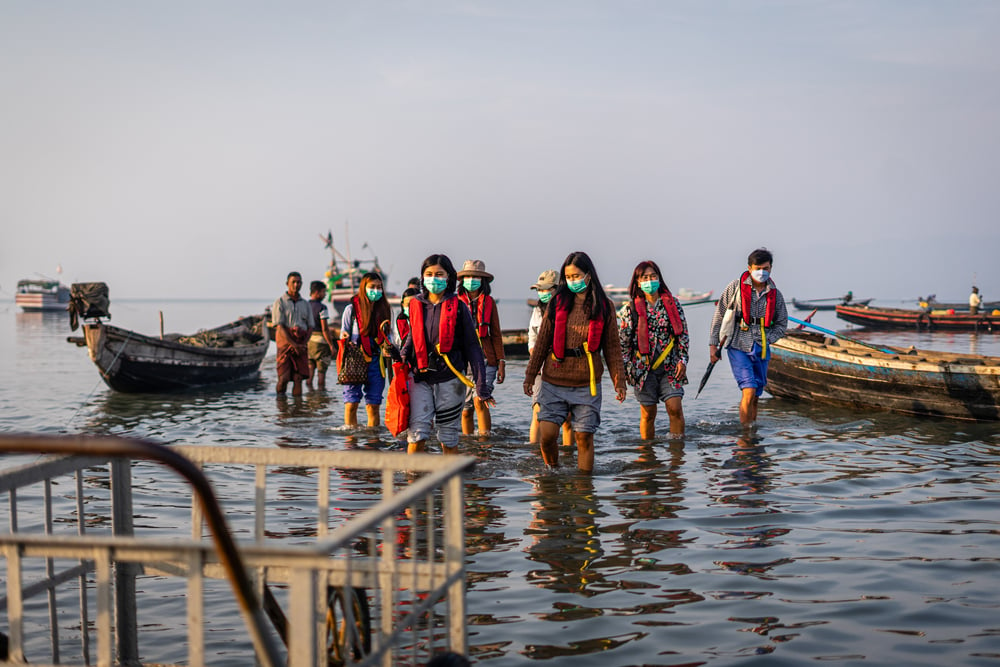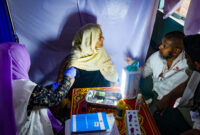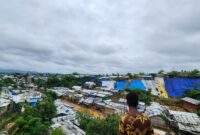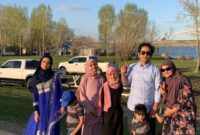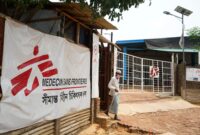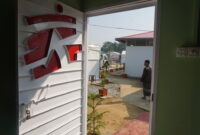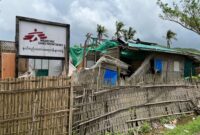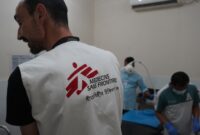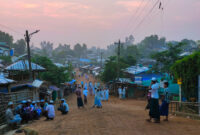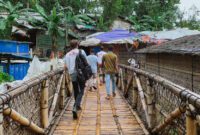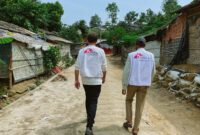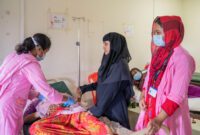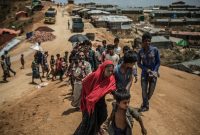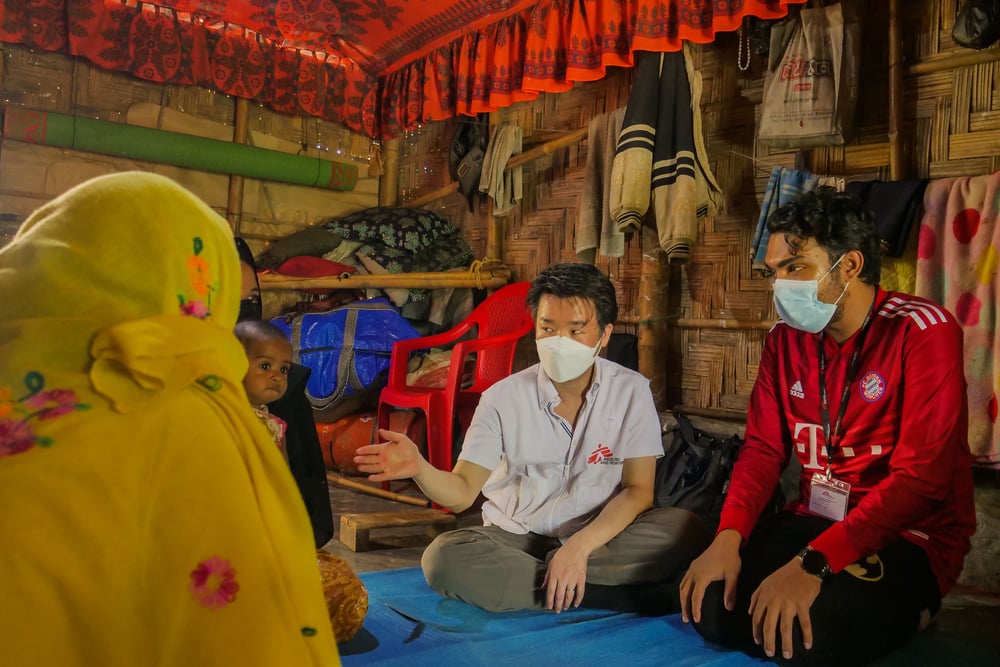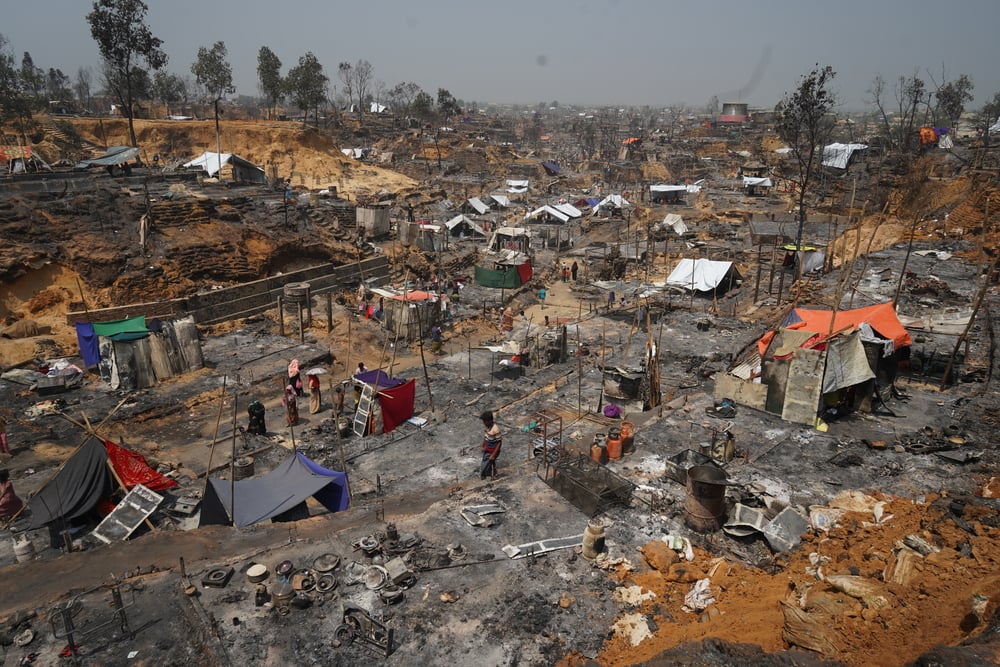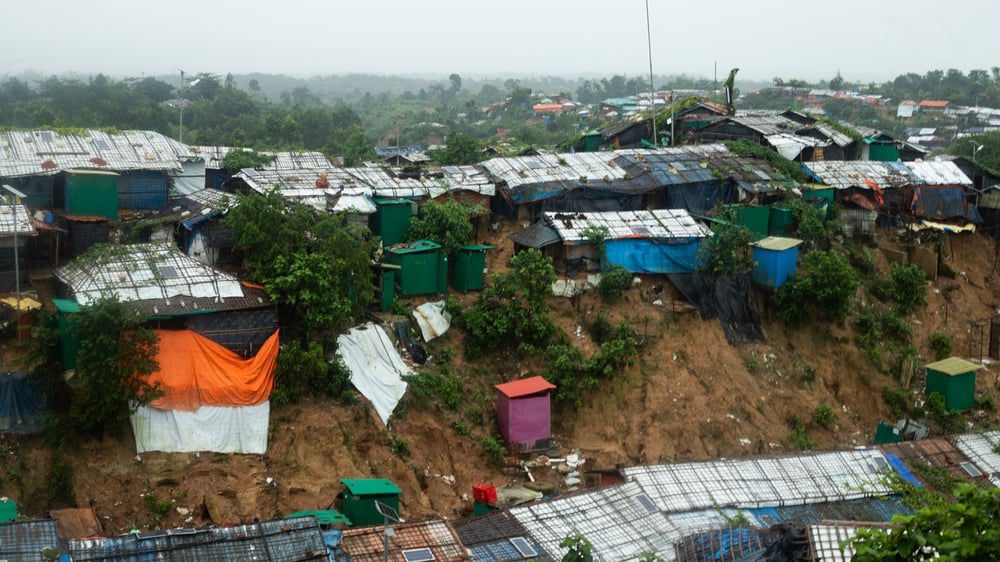After 10 years in camps in Myanmar, Rohingya mental health continues to suffer
In 2012, when violence erupted between Rohingya and Rakhine communities, Zaw Rina’s home in Pauktaw town was burned down. She was forced to flee with her family to a camp in Ah Nauk Ywe on a difficult-to-reach island in the remote western part of the state. The impermanence of the fragile bamboo structure she lives in now belies the decade she has spent in the camp.
Flimsy shelter next to flimsy shelter line narrow, muddy pathways through the overcrowded camps in which more than 5,000 people live. Drainage is insufficient, with puddles of stagnant water a breeding ground for mosquitos and disease. There are too many people for too few toilets, while low water supplies, particularly in the dry season, means the facilities are typically filthy. Privacy is almost impossible to find.
That violence in 2012 that saw Zaw Rina’s home destroyed and killed hundreds, drove some 140,000 people, both Rohingya and Kaman Muslims, into these camps. Most remain there today where they have limited freedom of movement, denying them access to paid work, education and healthcare. Many embark on perilous journeys over sea and land to Bangladesh and Malaysia in the hope of a better life.
Impacting mental health

rong>
The day-to-day existence for Zaw Rina and thousands of others like her living in Rakhine state is underlined by struggles to afford food, safety fears, and feelings of hopelessness. This protracted status quo has drastic consequences on mental health.
The stress of living in these conditions was compounded when Zaw Rina’s 20-year-old daughter attempted suicide after her husband asked for a divorce.
“She was having a lot of serious fights with her mother-in-law and her husband turned around and said ‘I don’t like you and I want to get divorced, I did not marry you because I loved you’,” Zaw Rina said.
“I became very pessimistic and couldn’t find much to be positive about. I shouted at my husband. I shouted at my children. I could not find an answer within myself.”
Across Myanmar, there are huge gaps in mental healthcare services. Rakhine state is no different, leaving people like Zaw Rina and her daughter with few options. There is one dedicated private mental health clinic in Sittwe, but it is too expensive for most people, while psychiatry services at the public hospital are very limited. Exacerbating their challenges, the city is some 10 kilometres across the Kaladan River from the camps in Pauktaw township – both the distance and movement restrictions make it incredibly difficult for Rohingya living in camps to even reach these facilities.
Through its clinics in the camps, however, Doctors Without Borders/Médecins Sans Frontières (MSF) is able to come to Rohingya to provide vital mental healthcare support, with counsellors and doctors providing one-on-one appointments, group sessions and home visits. These services are available to anyone who comes to our facilities, no matter their ethnicity or religion.
Both Zaw Rina and her daughter received counselling from MSF, helping them better manage their symptoms.
“I really felt lost and didn’t know where to ask for help until I met with the [MSF] counsellor,” she said.
“I am feeling better now in terms of my mental health, a lot better, and for my daughter too.”
Struggling to earn an income from Sittwe’s ghetto

rong>
Although Daw Than Than was born to Buddhist parents in Mandalay, she married a Kaman Muslim, changed her religion and now lives together with Rohingya and Kaman in Aung Mingalar, a Muslim ghetto in the centre of Sittwe.
This is where the remnants of Sittwe’s Muslim population, which used to number almost half the city’s 200,000 residents, live. The rest fled during the violence in 2012 or were forced into camps like the one where Zaw Rina lives. For 10 years, Muslims in downtown Sittwe have been confined to this small neighbourhood, denied freedom to move and with police outposts guarding it day and night.
Daw Than Than is widowed. She has no children or family to support her. When she can, she cooks and cleans in people’s homes. But unable to come and go from the neighbourhood over the years, she has often struggled to earn an income.
Although movement restrictions into and out of the ghetto have eased in the last year, allowing her to move around Sittwe, her physical health worsened, preventing her from working. “I feel sad because I struggle alone in my life. I feel lonely and sad because I have no one to support me when I feel sick. I can’t afford to go to a private hospital,” she said, adding how she does not have enough money to eat properly, often subsisting on rice and green tea.
Every Friday, MSF opens a clinic in Aung Mingalar where people from within the ghetto come to receive basic healthcare, mental health support and treatment for non-communicable diseases.
“I am struggling and feel sad in my life, but when I speak [to MSF counsellors], I feel some relief. The counsellors invite me to come whenever I feel pain in my body or my mind,” she said.
“They help me with breathing exercises, which are really helpful for relaxing. During counselling sessions, I cannot control my feelings though, and I cry.
“The counsellors speak to me with compassion and tell me ‘I understand your problems’.”
Violence exacerbating Rohingya women’s mental health

rong>
The challenging, stressful conditions in which Rohingya are detained in cramped camps, with limited economic opportunities and reliant on humanitarian assistance leaves women and girls at greater risk of abuse, sexual harassment and domestic violence.
Khin Phyu Oo first came to MSF’s Sin Thet Maw clinic after having a seizure. When staff from the clinic told her to be careful around the stove when she is cooking because of her condition, her husband was frustrated she could not do her house chores and beat her. This was one of a number of incidents of her husband attacking her, which left her feeling suicidal. This was when she began to receive counselling from MSF, alongside her seizure treatment.
“I have no one to open up to [in the community]. Nobody wants to listen to me. I am happy to come here and say everything that is on my mind,” she said.
“I feel happier. I think getting treatment is good for me. I can open up to the doctors here and they motivate me, give me suggestions [about how to make myself feel better]. The doctors also gave my husband mental health education.”
Overcoming the root causes of mental health

Rohingya will continue to struggle with their mental health while the root causes of their distress remain unresolved.
“I have hope my children can get an education one day,” said Zaw Rina.
“And I want a good shelter so I can live a normal and enjoyable life, like I had back in Pauktaw town. When I lived in my own house, I felt secure.”
MSF has been working in Myanmar since 1992, assisting people affected by conflict and struggling to access healthcare. Today, over 1,000 staff provide basic healthcare, HIV, hepatitis C and tuberculosis treatment, and referrals to hospitals for emergency and specialised treatment across Kachin, Rakhine, Shan, Tanintharyi and Yangon states and regions. In Rakhine, MSF teams support communities displaced by conflict, including Rakhine Buddhists, and Rohingya and Kaman Muslims.
